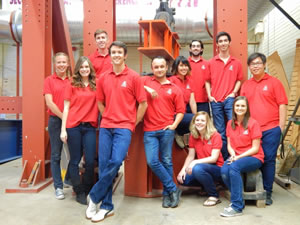Building Infrastructures to Stand the Test of Time
Civil engineers are tasked with building and maintaining bridges and dams, water treatment and manufacturing plants, energy systems, roads, airports, sea ports, skyscrapers and sports arenas – all constructed to withstand the forces of nature and humankind and using materials and methods that will not take from the needs of future generations.
Academics > Research Opportunities > Outside the Classroom > Career Paths >
Ever raced a two-person concrete canoe across a lake? Constructed and deconstructed a bridge on one level of a raised parking lot in a single day? Many of our students have, as part of an American Society of Civil Engineers college competition.
Academic Focus Areas
The UA civil engineering degree program, which involves several interdisciplinary areas, includes these focus areas:
- Construction engineering management covers heavy civil and building construction.
- Structural engineering deals with the design and analysis of buildings and bridges.
- Geotechnical engineering concentrates on the rock and soil upon which structures are built.
- Transportation engineering focuses on roads and highways and improving traffic flow.
- Hydraulic engineering homes in on the collection, transport and management of water resources.
- Environmental engineering centers around wastewater treatment.
Research Opportunities
UA civil engineering is known for development of DynusT, or Dynamic Urban Systems for Transportation, a widely integrated dynamic traffic simulator. Among other purposes, it is used to plan routing and evacuation after structural failures, such as the May, 2015 collapse of Interstate 35 in Texas.
Now researchers are working on projects that involve, for example:
- Detecting and mitigating structural weaknesses
- Creating earthquake-proof buildings
- Managing water reuse and supply systems
- Using geopolymers to reduce wind erosion of mine tailings
- Reusing concrete materials

Outside the Classroom
There is no substitute for real-world experience, and civil engineering faculty urge all students in the program to complete at least on internship with an industry partner. Senior design projects provide students with opportunities to work on prototypes and products in real-life situations. And student chapters of professional organizations – American Society of Civil Engineers, Institute of Transportation Engineers and Women in Civil Engineering – reinforce the values of leadership and teamwork and provide opportunities for career development and research.

Career Paths
Our civil engineering graduates have the ability to think creatively and scientifically and solve complex problems quickly. They work as engineers, consultants, supervisors and administrators for construction firms, water, power and gas companies, mining operations, land developers, manufacturers, transportation companies, and local and state governments.



